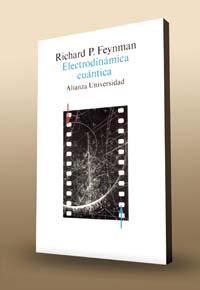Advanced physics for all

Strange theory of light and matter.
Richard Feynman was a special man. He was an exceptional physicist who was awarded the Nobel Prize in 1965. On the other hand, he was a very good teacher, many of his classes and lectures were filmed and transcribed, and with this material -among others- they formed several books. And besides, he had an optimistic and open character; for example, it is known that the bongo liked to play, and his biography is full of fun anecdotes.
For some, XX. Feynman, after Albert Einstein, has been the best physicist of the century. It is only an opinion, perhaps a sensationalist assessment, but there is no doubt that it was the one that contributed the most to physics today.
Feynman's main contribution was the development of the theory that this book has titled: quantum electrodynamics. In reality, it is the theory of the interaction between electrons and photons, which does not seem very extraordinary within physics. But it is an innovative and "rare" theory (Feynman himself says it in the book's subtitle). For example, according to this theory, vacuum is not always empty, but matter and energy are generated spontaneously and disappear quickly. It seems like a magic, but it happens; in fact, almost everything we know today about particle physics is based on this type of event.
When Feynman explained his theory to the creators of quantum physics, they said it was not possible to accept it. It had too strange consequences, beyond human understanding. However, time has given Feynman reason. Quantum electrodynamics explains, without exception, the results of all experiments carried out to date. And it has become the basic theory of modern physics.
Thanks to this book, Feynman explains to you the theory, the reader, explained by the special man who developed it. Feynman prepared some lectures for non-experts in physics that are collected in this book.
In his explanations he emphasized the explanation of phenomena close to anyone, for example, why light moves in a straight line. Or why you see the colors of the rainbow on the surface of an oil stain.
Feynman elaborated with these talks a precious informative book, but whoever wants to see the mathematical details of the theory will have to go in search of a textbook.





